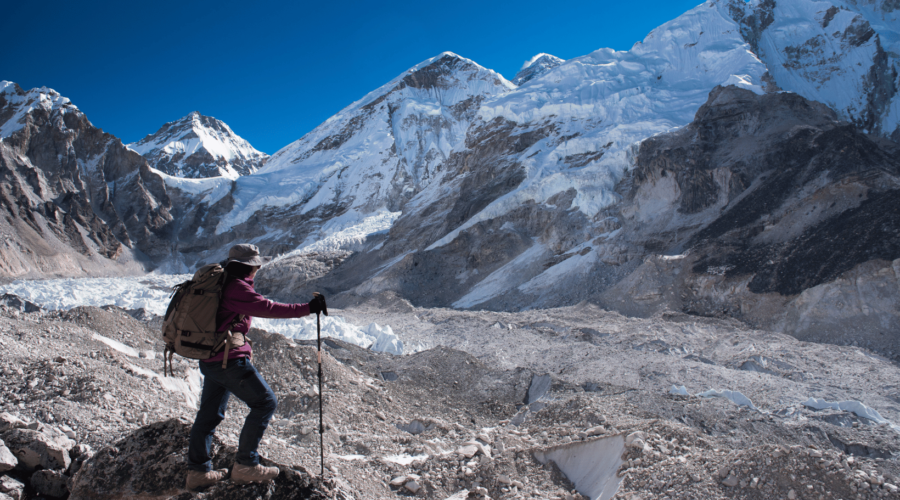Welcome to the adventure of a lifetime—the Everest Base Camp trek! Embark on a journey that will take you through some of the most breathtaking landscapes on Earth, as you trek through the heart of the Himalayas to the iconic base camp of the world’s highest mountain. This introductory guide will provide you with essential information and insights to help you prepare for this epic adventure, from understanding the trek’s challenges and highlights to ensuring you have the right gear and mindset for the journey ahead. So lace up your boots, pack your sense of adventure, and get ready to experience the wonders of Everest Base Camp trekking firsthand!
Price Includes
Price Excludes
Continue trekking along the Dudh Kosi River.
Cross suspension bridges and ascend gradually to Namche Bazaar.
Rest and acclimatize in the vibrant Sherpa town of Namche.
A: Prior trekking experience is not required, but a good level of fitness and stamina is recommended to tackle the challenging terrain and high altitude of the Himalayas.
A: To prepare for the trek, we recommend regular cardiovascular exercise, strength training, and hiking practice to build endurance and stamina. Additionally, acclimatization to high altitude is crucial, so consider spending a few days in Kathmandu or engaging in shorter treks at altitude before starting the Everest Base Camp Trek.
A: The highest point reached during the trek is Everest Base Camp itself, which sits at an altitude of approximately 5,364 meters (17,598 feet) above sea level. Additionally, trekkers may ascend to higher viewpoints such as Kala Patthar (5,550 meters/18,208 feet) for panoramic views of Mount Everest.
A: The Everest Base Camp Trek is a legendary journey that takes trekkers to the base camp of Mount Everest, the world’s highest peak, located in the heart of the Himalayas.
A: The typical duration for the Everest Base Camp Trek is around 12-14 days, including arrival and departure days. However, the exact duration can vary depending on the itinerary and trekking pace.
A: The best time to trek to Everest Base Camp is during the spring (March to May) and autumn (September to November) seasons when the weather is generally stable, skies are clear, and temperatures are moderate.
A: Trekkers are encouraged to respect local customs and traditions, including dressing modestly, asking for permission before taking photographs, and refraining from littering or damaging the environment. Our guides will provide cultural insights and etiquette guidelines to ensure respectful interactions with local communities.
A: The Leave No Trace principle emphasizes minimizing environmental impact by packing out all waste, avoiding unnecessary disturbance to wildlife and vegetation, and leaving natural areas pristine for future generations to enjoy. Trekkers are encouraged to follow Leave No Trace guidelines and dispose of waste responsibly during the trek.
A: Yes, trekkers are required to obtain permits for trekking in the Everest region, including the Sagarmatha National Park Entry Permit and the Khumbu Pasang Lhamu Rural Municipality Entrance Permit. Our team will assist you in obtaining the necessary permits prior to the trek.
A: To prevent altitude sickness, it is essential to acclimatize gradually, stay hydrated, avoid alcohol and tobacco, and listen to your body’s signals. Our experienced guides are trained to recognize symptoms of altitude sickness and provide necessary assistance and guidance.
A: Yes, comprehensive travel insurance that covers medical emergencies, evacuation, and trip cancellation is mandatory for all trekkers undertaking the Everest Base Camp Trek. Please ensure that your insurance policy provides adequate coverage for high-altitude trekking and adventure activities.
A: Basic medical facilities and first aid kits are available at tea houses along the trekking route. In case of emergency or serious medical issues, helicopter evacuation services are available for swift evacuation to medical facilities in Kathmandu.
A: Accommodation along the Everest Base Camp Trek consists of basic tea houses or trekking lodges, which provide simple yet comfortable lodging with communal dining areas and shared toilet facilities.
A: Yes, three hearty meals (breakfast, lunch, and dinner) are included each day during the trek, typically consisting of locally sourced and freshly prepared Nepali and international cuisine served at the tea houses along the route.
A: While some trekking gear such as sleeping bags may be available for rent or purchase in Kathmandu, we recommend bringing your own to ensure comfort and familiarity. Essential trekking gear includes sturdy hiking boots, warm layers, a waterproof jacket, and a daypack.
A: We recommend booking your Everest Base Camp Trek at least 3-6 months in advance, especially during the peak trekking seasons of spring and autumn, to secure permits, accommodations, and flight tickets.
A: To book your trek, simply contact us through our website or email and provide your preferred trekking dates, group size, and any special requests. Our team will assist you in customizing your itinerary, confirming availability, and arranging payment details.
A: Our cancellation policy varies depending on the time of cancellation and the terms and conditions of our service providers. Generally, cancellations made within 30 days of the trek departure date may incur a cancellation fee, while cancellations made earlier may be eligible for a partial refund or rescheduling.
A: Yes, we understand that unforeseen circumstances may arise that require you to reschedule your trek. Please contact us as soon as possible if you need to reschedule, and we will do our best to accommodate your request based on availability and our rescheduling policies.
A: In the rare event that the Everest Base Camp Trek is canceled due to inclement weather, natural disasters, political unrest, or other unforeseen events beyond our control, we will work with you to reschedule the trek for a later date or provide alternative trekking options.
A: While we do not provide travel insurance directly, we highly recommend purchasing comprehensive travel insurance that covers medical emergencies, trip cancellation, and evacuation for the duration of your trek. Our team can provide recommendations for reputable travel insurance providers.
A: We accept payment for trek bookings via bank transfer, credit card, or online payment platforms. Once your booking is confirmed, our team will provide you with detailed payment instructions and options for secure payment.
A: We do not have a minimum group size requirement for the Everest Base Camp Trek. Whether you are traveling solo, with a partner, or in a group, we can accommodate your trekking needs and preferences.

